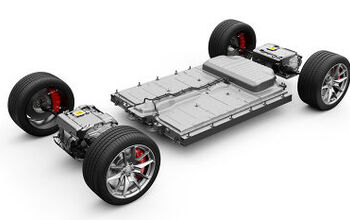Renault Spy Scandal Turns Into Farce. Cover For Lack Of Leaf Sales?

Ever since the Renault spy story broke, we had our doubts. It simply did not pass the smell test. Now, the smelly stuff is hitting the fan. “France faced severe political embarrassment on Friday after carmaker Renault said the three top executives it sacked for industrial espionage in January might not be spies after all,” reports Reuters.
In an interview with Le Figaro, Renault COO Patrick Pelata, the man who was the driving force behind the scandal admitted: “A number of elements lead us to doubt.” He is not alone in his doubts.
The scandal may lead to further sackings: Patrick Pelata’s job is on the line. He already announced his readiness to accept the consequences “up to the company’s highest levels — that means as high as myself.”
Pelata, and possibly more, will have to take the fall to protect Carlos Ghosn. “In this story, somebody has to throw themselves on the grenade,” an unnamed Reuters source said.
Despite the attempts of the French intelligence services, no secret bank accounts or any other proof could be connected with the accused.
Also, no signs of “la piste chinoise” (the Chinese angle) that had made the rounds in France and caused a diplomatic row between France and China. Especially after France’s industry minister Eric Bresson accused other countries of waging “economic warfare” against La France.
Bresson didn’t say “China”. There was no need: Everybody, wink-wink, nod-nod, got “China.” Now, even Bresson points fingers at Renault and says that “Patrick Pelata may quit if it turns out that the company made groundless accusations in the recent spying case,” as the Wall Street Journal reports.
Government-owned China Daily today notes with great satisfaction that “French automaker Renault said Friday it might have committed an error in accusing three of its executives of leaking business secrets to some foreign competitors.”
Pelata now says his company has been tricked. China Daily delights in quoting Pelata’s new theories:
“(There are) two hypotheses. Either we are dealing with a case of espionage … or Renault is a victim of manipulation … which could take the form of a scam. In this case, if all doubts are removed, we propose the reintegration of the three senior executives.”
When the story broke in January, “many of Renault’s competitors were puzzled by its claim that three senior executives leaked company secrets from its electric cars program in exchange for payments into their foreign bank accounts,” writes Financial Times. Ian Robertson, BMW’s head of sales said: “We know what they do on electric vehicles. There isn’t a lot of knowledge that’s hot and confidential.” BMW should know, they are in a formal EV joint venture with France’s PSA. There are very few secrets in the polyamorous European car industry.
So what’s the real reason behind le scandale? Financial Times thinks it’s internal infighting:
“Outside Renault, theories are now proliferating about what went wrong.One is that someone inside the company was trying to discredit Mr Ghosn, whose hard-driving style has alienated some staff.”
That angle had come up immediately when the story broke in January. “This may have less to do with foreign attackers than in-house rivalries,” TTAC wrote on Jan 6. According to Der Spiegel, the team around Michel Balthazard, one of the dismissed, had made “disrespectful comments regarding the corporate strategy” of Renault: “EVs harbor many unsolved problems, for which there is not even a hint of a solution.”
Also, the Leaf is not necessarily flying off the shelves. Shortly before the scandal broke, there were ominous supply problems. In December 2010, Nissan recorded 19 Leafs as sold stateside. Nissan sold 87 Leafs in January in the U.S. In February, the Leafs dropped to 67 sold. At home in Japan, the Nissan Leaf is nowhere to be seen on JADA’s list of the 30 top selling cars. Don’t even look for the Leaf in Nissan’s January 2011 production, sales, and export results.
This is the true scandal. Ghosn is betting the farm on EVs, and they aren’t selling. The Pink Panther sequel is just a diversion.

Bertel Schmitt comes back to journalism after taking a 35 year break in advertising and marketing. He ran and owned advertising agencies in Duesseldorf, Germany, and New York City. Volkswagen A.G. was Bertel's most important corporate account. Schmitt's advertising and marketing career touched many corners of the industry with a special focus on automotive products and services. Since 2004, he lives in Japan and China with his wife <a href="http://www.tomokoandbertel.com"> Tomoko </a>. Bertel Schmitt is a founding board member of the <a href="http://www.offshoresuperseries.com"> Offshore Super Series </a>, an American offshore powerboat racing organization. He is co-owner of the racing team Typhoon.
More by Bertel Schmitt
Latest Car Reviews
Read moreLatest Product Reviews
Read moreRecent Comments
- Ltcmgm78 It depends on whether or not the union is a help or a hindrance to the manufacturer and workers. A union isn't needed if the manufacturer takes care of its workers.
- Honda1 Unions were needed back in the early days, not needed know. There are plenty of rules and regulations and government agencies that keep companies in line. It's just a money grad and nothing more. Fain is a punk!
- 1995 SC If the necessary number of employees vote to unionize then yes, they should be unionized. That's how it works.
- Sobhuza Trooper That Dave Thomas fella sounds like the kind of twit who is oh-so-quick to tell us how easy and fun the bus is for any and all of your personal transportation needs. The time to get to and from the bus stop is never a concern. The time waiting for the bus is never a concern. The time waiting for a connection (if there is one) is never a concern. The weather is never a concern. Whatever you might be carrying or intend to purchase is never a concern. Nope, Boo Cars! Yeah Buses! Buses rule!Needless to say, these twits don't actual take the damn bus.
- MaintenanceCosts Nobody here seems to acknowledge that there are multiple use cases for cars.Some people spend all their time driving all over the country and need every mile and minute of time savings. ICE cars are better for them right now.Some people only drive locally and fly when they travel. For them, there's probably a range number that works, and they don't really need more. For the uses for which we use our EV, that would be around 150 miles. The other thing about a low range requirement is it can make 120V charging viable. If you don't drive more than an average of about 40 miles/day, you can probably get enough electrons through a wall outlet. We spent over two years charging our Bolt only through 120V, while our house was getting rebuilt, and never had an issue.Those are extremes. There are all sorts of use cases in between, which probably represent the majority of drivers. For some users, what's needed is more range. But I think for most users, what's needed is better charging. Retrofit apartment garages like Tim's with 240V outlets at every spot. Install more L3 chargers in supermarket parking lots and alongside gas stations. Make chargers that work like Tesla Superchargers as ubiquitous as gas stations, and EV charging will not be an issue for most users.
































Comments
Join the conversation
They only sold 173 not so expensive, made by a reputable manufacturer electric cars in three months. That doesn't sound as a sell problem but as a make problem
Bertel, you are getting pathetic in your hate of electric cars. Everyone knows that the dismal sales numbers of the Leaf is a supply problem, not a demand problem. So why do you say they are not selling?